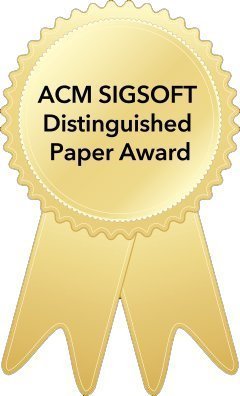Causal Relationships and Programming Outcomes: A Transcranial Magnetic Stimulation Experiment
Understanding the relationship between cognition and programming outcomes is important: it can inform interventions that help novices become experts faster. Neuroimaging techniques can measure brain activity, but prior studies of programming report only correlations. We present the first causal neurological investigation of the cognition of programming by using \emph{Transcranial Magnetic Stimulation} (TMS). TMS permits temporary and noninvasive disruption of specific brain regions. By disrupting brain regions and then measuring programming outcomes, we discover whether a true causal relationship exists. To the best of our knowledge, this is the first use of TMS to study software engineering.
Where multiple previous studies reported correlations, we find no direct causal relationships between implicated brain regions and programming. Using a protocol that follows TMS best practices and mitigates for biases, we replicate psychology findings that TMS affects spatial tasks. We then find that neurostimulation can affect programming outcomes. Multi-level regression analysis shows that TMS stimulation of different regions significantly accounts for 2.2% of the variance in task completion time. Our results have implications for interventions in education and training as well as research into causal cognitive relationships.
Wed 17 AprDisplayed time zone: Lisbon change
14:00 - 15:30 | Human and Social 2Research Track / Software Engineering Education and Training / Software Engineering in Society / Demonstrations at Glicínia Quartin Chair(s): Ayushi Rastogi University of Groningen, The Netherlands | ||
14:00 15mTalk | Causal Relationships and Programming Outcomes: A Transcranial Magnetic Stimulation Experiment Research Track Hammad Ahmad University of Michigan, Madeline Endres University of Michgain, Kaia Newman Carnegie Mellon University, Priscila Santiesteban University of Michigan, Emma Shedden University of Michigan, Westley Weimer University of Michigan | ||
14:15 15mTalk | Training App Developers in a Software Studio: The Business Nano Challenge Experience Software Engineering Education and Training Tania Mara Dors Pontifícia Universidade Católica do Paraná, Ana Paula Schran de Almeida Pontifícia Universidade Católica do Paraná, Lohine Mussi Pontifícia Universidade Católica do Paraná, Fabio Vinicius Binder Pontifícia Universidade Católica do Paraná, Sheila Reinehr Pontifícia Universidade Católica do Paraná (PUCPR), Andreia Malucelli Pontifícia Universidade Católica do Paraná | ||
14:30 15mTalk | Breaking Barriers: Investigating the Sense of Belonging Among Women and Non-Binary Students in Software Engineering Software Engineering Education and Training Lina Boman University of Gothenburg, Jonatan Andersson University of Gothenburg, Francisco Gomes de Oliveira Neto Chalmers | University of Gothenburg | ||
14:45 15mTalk | Micro-inequities and immigration backgrounds in the software industry Software Engineering in Society | ||
15:00 15mTalk | Alexa, is the skill always safe? Uncover Lenient Skill Vetting Process and Protect User Privacy at Run Time Software Engineering in Society Tu Le University of California, Irvine, Dongfang Zhao Indiana University Bloomington, Zihao Wang Indiana University Bloomington, XiaoFeng Wang Indiana University Bloomington, Yuan Tian Media Attached | ||
15:15 7mTalk | CodeGRITS: A Research Toolkit for Developer Behavior and Eye Tracking in IDE Demonstrations Ningzhi Tang University of Notre Dame, Junwen An , Meng Chen , Aakash Bansal University of Notre Dame, Yu Huang Vanderbilt University, Collin McMillan University of Notre Dame, Toby Jia-Jun Li University of Notre Dame | ||